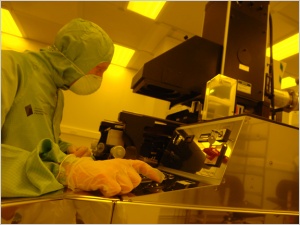Apr 23 2009
Professor Peter Ashburn is leading a team of University researchers who are developing low-cost, disposable blood-testing kits that can be made available in GPs' surgeries.
 Copyright: Russell Sach
Copyright: Russell Sach
With funding of £1.33M from the EPSRC (Engineering and Physical Sciences Research Council),
Professor Ashburn, Head of the Nano Research Group in the School of Electronics and Computer Science, will work with colleagues in ECS, Medicine, Chemistry, to develop a unique method for fabricating nanowires, so that the blood-testing kits can be mass-produced. This will mean that routine blood tests can be carried out in GPs' surgeries, rather than needing to be sent to laboratories, with inevitable delays. The researchers are using nanotechnology similar to that commonly used in computer and television displays to develop this new application.
'Standard clinical laboratory tests currently have limitations outside the laboratory,' said Professor Ashburn. 'This can reduce the impact of new protein biomarkers for diagnosing complex conditions like cancer and chronic inflammation.
'However, one-dimensional nanostructures such as nanowires are ideal for the purposes of diagnosis, since they can be integrated into microfluidic chips that provide a complete sensor system.'
Because of the impact that new technology such as this would have on healthcare, a major part of the research project involves the School of Social Sciences at the University of Southampton in the assessment of sociological aspects involved in the take-up of nanotechnology in healthcare. 'We need to understand how this new mechanism for blood-testing sits in relation to established organizational forms, professional knowledge and inter-professional relations,' said Professor Susan Halford.
'In particular, replacing hospital lab tests with GP-administered tests requires a whole series of subtle and highly politicized changes to the organization of healthcare. Whilst the technology holds enormous potential, if it is to deliver the socially beneficial innovation so highly prioritized in public consultation, we need to develop in-depth understanding of how it can actually come into use.'
The funding award for this research comes from the EPSRC’s Nano Grand Challenge in Healthcare scheme.